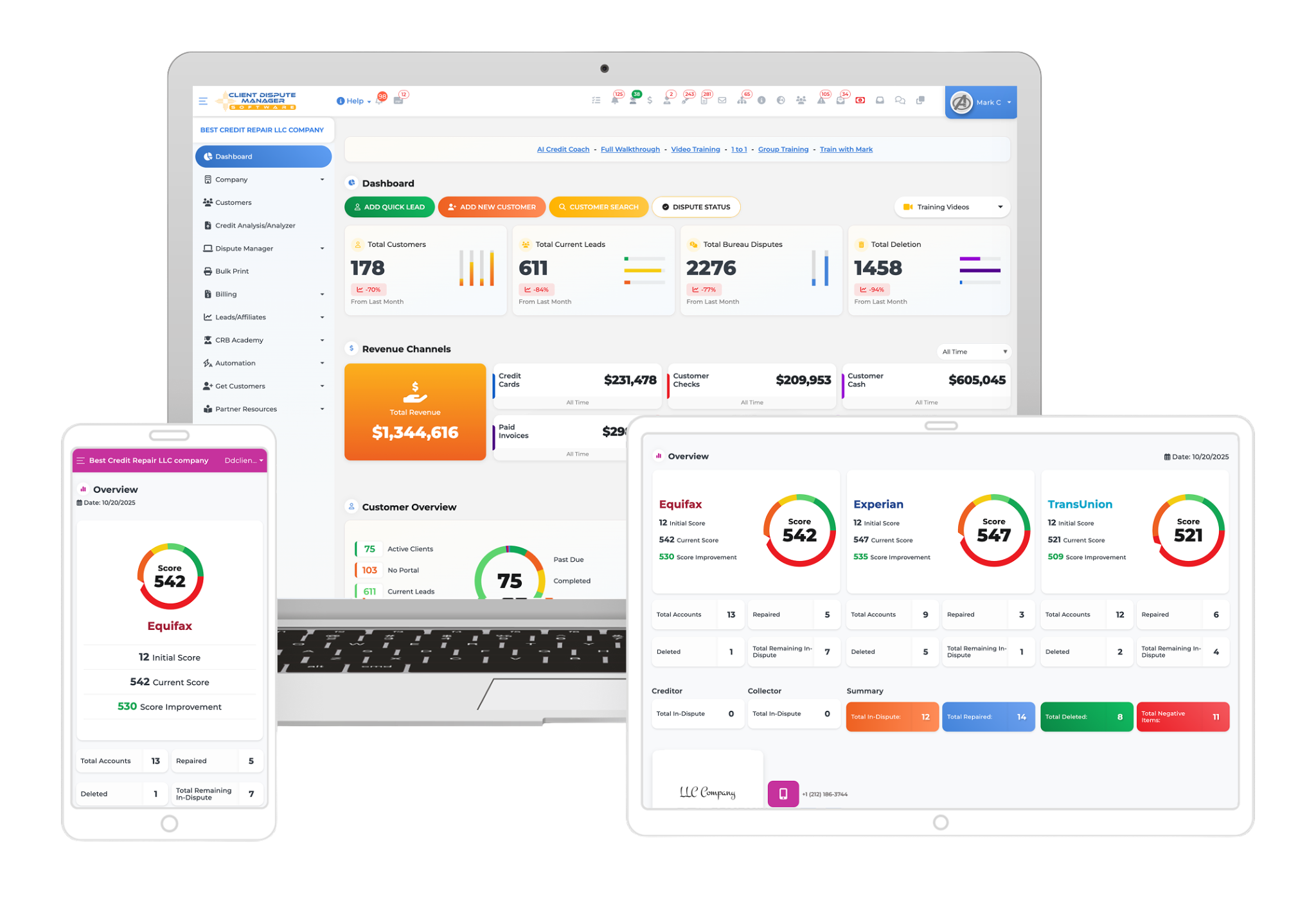In today’s digital landscape, how can credit repair businesses protect sensitive client data? This question is crucial for anyone in the credit repair industry. Let’s dive into the world of data security in credit repair and explore practical ways to safeguard your business and client information.
Start Today and Explore the Features Firsthand!
Why is Data Security in Credit Repair Critical for Businesses?
Data security in credit repair is not just a luxury; it’s a necessity. Credit repair business security is paramount when handling sensitive financial information. By prioritizing data security, you can prevent credit repair data breaches and ensure client information confidentiality.
The Risks of Poor Data Security
When a credit repair business fails to protect client data, the consequences can be severe. Clients may lose faith in your ability to handle their sensitive information, leading to a loss of business. Legal ramifications can include hefty fines and potential lawsuits.
Financial penalties can be substantial, potentially crippling small businesses. Perhaps most damaging is the long-term impact on your business’s reputation, which can be challenging to rebuild once trust is broken.
Implementing Robust Credit Repair Business Security Measures
Protecting your credit repair business from data breaches requires a multi-faceted approach. By implementing comprehensive security measures, you can significantly reduce the risk of unauthorized access to sensitive client information.
Choosing Secure Credit Repair Software

Selecting the right software is crucial for maintaining data security in credit repair. Look for solutions that offer end-to-end encryption, ensuring that data is protected both in transit and at rest. Regular security updates are essential to address new vulnerabilities as they’re discovered.
Multi-factor authentication adds an extra layer of security, making it much harder for unauthorized users to gain access. Secure cloud storage can provide additional protection and accessibility, but make sure to choose a reputable provider with a strong track record in data security.
Training Your Team on Cybersecurity Best Practices
Your employees are your first line of defense in credit repair business security. Regular training can help prevent many common security issues and reinforce the importance of safeguarding client information. Educate your team on password best practices, including creating strong, unique passwords and avoiding password reuse across multiple accounts.
Train them to recognize phishing attempts, which often come in the form of deceptive emails or messages. Encourage safe internet browsing habits and proper handling of client information to minimize risks.
Implementing Strong Access Controls
Not everyone in your organization needs access to all data. Limit access based on job roles and responsibilities. This principle of least privilege helps minimize the risk of internal data breaches and limits potential damage if an employee’s credentials are compromised.
Regularly review and update these access controls, especially when employees change roles or leave the company.
Start Today and Explore the Features Firsthand!
Ensuring Client Information Confidentiality in Credit Repair
Maintaining the confidentiality of client information is not just a legal requirement; it’s a cornerstone of trust in the credit repair industry. Implementing strict confidentiality measures protects your clients and your business reputation.
Clean Desk Policy
Encourage employees to keep their workspaces clear of sensitive documents when not in use. This reduces the risk of unauthorized access to client information and helps create a culture of security consciousness in your credit repair business. Provide secure storage options like locked drawers or cabinets for physical documents.
Encourage the use of password-protected screen savers and the habit of locking computers when stepping away, even for short periods.
Secure File Destruction Methods
Properly dispose of physical documents containing client information. Use cross-cut shredders or professional document destruction services. For digital files, use secure deletion methods that overwrite the data multiple times, making it unrecoverable. Establish clear procedures for document destruction and train all employees on these methods.
Consider implementing a regular schedule for secure document disposal to prevent the accumulation of unnecessary sensitive information.
Data Collection and Retention Limits
Only collect and keep the client data you absolutely need. The less sensitive information you store, the lower your risk of credit repair data breaches. Review your data collection practices regularly to ensure you’re not unnecessarily increasing your risk. Implement a data retention policy that outlines how long different types of information should be kept and when they should be securely destroyed.
Best Practices for Preventing Credit Repair Data Breaches

Preventing data breaches requires constant vigilance and a proactive approach to security. By implementing best practices, you can significantly reduce the risk of a breach and protect your clients’ sensitive information.
Regular Security Audits
Conduct periodic checks to identify vulnerabilities before they’re exploited. These audits should cover all aspects of your data security, including network security, physical security measures, employee access controls, software and hardware inventory, and compliance with relevant regulations.
Consider hiring external security experts to conduct these audits for an unbiased assessment of your security posture.
Use of Virtual Private Networks (VPNs)
VPNs add an extra layer of security, especially for remote workers accessing company systems. They encrypt internet traffic, making it much harder for hackers to intercept sensitive data.
Implement a company-wide VPN policy to enhance cybersecurity for credit repair operations. Provide easy-to-use VPN solutions for all employees, especially those who work remotely or travel for business.
Two-Factor Authentication
This adds an extra step to the login process, making it harder for unauthorized users to gain access. Two-factor authentication typically combines something the user knows (like a password) with something they have (like a mobile device for receiving codes) or something they are (like a fingerprint).
Implement two-factor authentication for all critical systems and encourage its use for employee accounts on any platforms handling sensitive information.
Network Activity Monitoring
Use security software to track and analyze network traffic for suspicious activity. This can help detect potential breaches early, allowing for quick response. Implement intrusion detection and prevention systems (IDS/IPS) to automatically identify and block suspicious activities. Regularly review logs and alerts from these systems, and have a process in place for investigating and responding to potential security incidents.
Start Today and Explore the Features Firsthand!
Legal Considerations for Safeguarding Client Information in Credit Repair
Navigating the legal landscape of data protection in the credit repair industry is crucial for maintaining compliance and avoiding costly penalties. Understanding and adhering to relevant regulations is an essential part of your overall security strategy.
Understanding Relevant Regulations
Familiarize yourself with laws like the Fair Credit Reporting Act (FCRA) and the Gramm-Leach-Bliley Act (GLBA). These regulations set standards for handling consumer financial information and have specific requirements for data security and privacy in the credit repair industry. Consider consulting with a legal expert specializing in data privacy to ensure your practices are fully compliant.
Developing Clear Privacy Policies
Clearly communicate to clients how their data will be used, stored, and protected. Your privacy policy should be easily accessible and written in clear, understandable language.
It should cover what information you collect, how you use it, who you share it with (if anyone), and how clients can access or request changes to their information. Regularly review and update your privacy policy to ensure it remains accurate and compliant with current regulations.
Obtaining Proper Consent
Always get client permission before collecting or sharing their personal information. Implement clear consent mechanisms in your client onboarding process and ensure that clients understand what they’re agreeing to. Keep records of client consent and provide easy ways for clients to withdraw consent if they choose to do so.
Building Trust Through Cybersecurity for Credit Repair

In the credit repair industry, trust is everything. By demonstrating your commitment to cybersecurity, you can build stronger relationships with your clients and set your business apart from competitors.
Open communication about your security measures can help build client trust and demonstrate your commitment to credit repair business security. Include security information on your website, detailing your commitment to protecting client data. During client onboarding, discuss your data protection measures, explaining how you safeguard their sensitive information.
Provide regular updates on your security practices through newsletters or direct communications. By being proactive and transparent about your security efforts, you not only build trust but also demonstrate your dedication to preventing credit repair data breaches.
The Role of Insurance in Credit Repair Business Security
While prevention is key, having a safety net in place can provide peace of mind and financial protection in case of a security incident. Cybersecurity insurance is an important consideration for any credit repair business.
Consider investing in cybersecurity insurance to provide an extra layer of protection for your business. This type of insurance typically covers data breach response costs, including notifying affected clients and providing credit monitoring services. It can also help with legal fees and settlements in case of lawsuits resulting from a breach.
Coverage often extends to business interruption expenses and reputation management, helping you recover financially and rebuild trust after an incident. When selecting a policy, carefully review the coverage details and ensure it aligns with your specific risks as a credit repair business.
Staying Ahead of Evolving Threats to Data Security in Credit Repair
The landscape of cybersecurity is constantly changing, with new threats emerging regularly. Staying informed and adaptable is crucial for maintaining robust data security in your credit repair business. The world of cybersecurity is always changing, and staying informed about new threats and security measures is crucial for maintaining effective cybersecurity for credit repair.
Subscribe to reputable cybersecurity newsletters to keep abreast of the latest trends and emerging threats. Attend industry conferences and webinars focused on data security in financial services. Consider joining professional associations related to cybersecurity or credit repair, which can provide valuable resources, training, and networking opportunities.
By staying informed and continuously updating your security practices, you can better protect your clients’ sensitive information and maintain the integrity of your credit repair business.
Start Today and Explore the Features Firsthand!
Frequently Asked Questions (FAQs)
How Often Should I Update My Credit Repair Software?
Aim to update your secure credit repair software as soon as new versions or patches are released, typically every few months. Regular updates are crucial for addressing newly discovered vulnerabilities and ensuring optimal protection for your clients’ data.
What's The Most Common Cause Of Data Breaches In Small Businesses?
Human error is often the leading cause of credit repair data breaches in small businesses. This can include falling for phishing scams, using weak passwords, or inadvertently sharing sensitive information. Regular training and clear security policies can help mitigate these risks.
Is Cloud Storage Safe For Storing Client Information?
Cloud storage can be very secure if you choose a reputable provider and implement proper security measures as part of your overall credit repair business security strategy. Ensure the provider offers strong encryption, multi-factor authentication, and compliance with relevant data protection regulations.
How Long Should I Retain Client Data?
Only keep client data for as long as necessary for business purposes or as required by law. Regularly review and securely dispose of outdated information to maintain client information confidentiality. Implement a clear data retention policy that outlines specific timeframes for different types of data.
What's the first step I should take if I suspect a data breach?
If you suspect a data breach, immediately isolate affected systems to prevent further data loss. Then, activate your data breach response plan to safeguard your credit repair business and client information. This should include steps for assessing the breach, notifying affected parties, and implementing recovery measures.
Conclusion
By implementing these strategies, you can significantly enhance the data security of your credit repair business. Remember, protecting client information is not just about compliance—it’s about building trust and maintaining your reputation in a competitive industry. Stay vigilant, keep learning, and make data security in credit repair a top priority in your business.

Mark Clayborne
Mark Clayborne specializes in credit repair, starting and running credit repair businesses. He's passionate about helping businesses gain freedom from their 9-5 and live the life they really want. You can follow him on YouTube.
Start Today and Explore the Features Firsthand!
Below Is More Content For Your Review:


